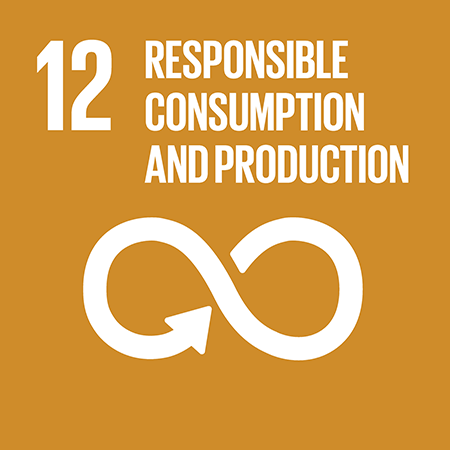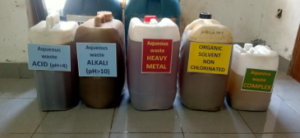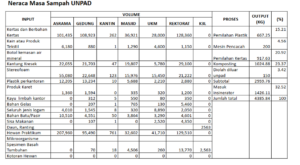
SDG 12: RESPONSIBLE CONSUMPTION AND PRODUCTION
In the other SDGs Goals are more related to sector targets so that sector development supports sustainable development. In this Goal, the emphasis is on actors, both companies (corporations), institutions and individuals in society to change behavior into sustainable behavior. This behavior is not only in terms of the use/supply of materials/production inputs, but also includes the processes of production, distribution and marketing as well as consumption as a corporation, institution or individual in the household. In the process of supplying materials/production inputs, they must be selected according to the standards of a sustainable procurement process. The production process carries out an efficient and sustainable production process, and produces minimal waste or at a safe level its impact on humans and the environment. Likewise, in the use of materials, it is recommended to use waste/recycle and use containers that can be used repeatedly and reduce the use of non-renewable materials that will have a negative impact on humans and the environment.
Operational measures
- Ethical sourcing policy
- Policy waste disposal - hazardous materials
- Policy waste disposal - landfill policy
- Policy for minimisation of plastic use
- Policy for minimisation of disposable items
- Disposable policy: extensions to services
- Minimisation policies extended to suppliers
1)Regulation of Canteen Management

Padjadjaran University has Chancellor’s Regulation Number 26 of 2022 relating to Canteen Management at Unpad. In these regulations, especially in article 12, canteens must pay attention to health, cleanliness, hygiene and halal food. The principles of canteen management are as follows:
(1) Maintaining the quality of food and beverage products served in the canteen, as well as providing friendly and efficient service to customers
(2) Providing a variety of menu options for a variety of tastes, special dietary needs, and food preferences
(3) Complying with applicable food safety standards, including storing, processing, and managing food safely to prevent contamination and disease
(4) Providing quality raw materials by ensuring a consistent supply and selecting sustainable raw materials.
Regulation of Canteen Management
2)Unpad Develops Halal Canteen and “Thayyib” Facilities
To guarantee quality food for students and the academic community, Unpad developed a halal and Tayib (Thayib) campus canteen. This canteen is located at GOR Santika, Jatinangor Campus, which is the main campus of Unpad. The soft launching of this canteen was held on October 4 2022, in collaboration between the Padjadjaran Halal Center and Bank Indonesia. As many as 34 canteen business actors were also involved in training on how to produce good food, such as choosing halal product raw materials, using supporting equipment, and creating processes that comply with halal standards. This canteen is open to all Unpad residents and operates from 08.00 to 18.00.
1)Toxic waste treatment at Unpad

Mostly, Hazardous and Toxic Waste was collected from academic activities, such as practice and research activities in the laboratory. and storage it at TSA (Temporary storage area) Ciparanje, Universitas Padjadjaran, Jatinangor Campus area. The waste is generally in the from of liquid which has pH that not suitable for the environment (high or low pH). TSA officers at Ciparanje, routinely surveys to each faculty that produces Hazardous and Toxic Waste to check whether the storage volume is full or not. If the waste is full, it will be taken to the TSA at Ciparanje to be storage and handed over to other companies that expert to handle the hazardous and toxic waste. Hazardous and Toxic Waste was obtained from laboratory, collected and storage in TSA, Ciparanje. Then the waste will be processed by other companies that expert to handle the hazardous and toxic waste.
Toxic waste treatment at Unpad
2)Management of Eco-Friendly Campus including handling hazardous materials
Padjadjaran University has a Chancellor’s Regulation regarding an eco-friendly campus. One of the concerns in this regulation is the management of hazardous waste by sorting organic, inorganic and residual waste including hazardous waste.
Management of Eco-Friendly Campus including handling hazardous materials
1)3R waste treatment at Unpad

TPS3R Ciparanje covering an area of 2,000 m2 is located 300 meters from the center of academic activities which is located in the northern part of the Unpad Jatinangor Campus. TPS3R is an integrated waste management system that carries out the principles of storage, 2-stage sorting, composting process, burning furnace, molding brick briquettes from combustion residue. Apart from being a 3R location, TPS3R Ciparanje Unpad is also a learning laboratory for Unpad students, high school/middle school students and the local community about the 3R system. The Ciparanje location is also a place to practice using 3R products such as using compost as fertilizer for cultivated/agricultural plants.
2) Inorganic Waste treatment at Unpad
The inorganic incinerator machine at TPS 3R Unpad Ciparanje need maintaining more because it had been used for several years for the process of managing solid inorganic waste, most of the components of the machine needed maintaining. Previously, the solid waste management from this incinerator was managed by PT. Bumeresik until 2016, but now is managed independently by PK3L UNPAD. The Solid waste residue can be destroyed using an incinerator with a temperature range of 800-1000oC./ (Burning furnace), the capacity of incinerator is around 1.426,11 kg or 24 % and continues to decline after the policy of reducing the use of single-use plastic packaging. Inorganic waste management using incinerators is currently managed by TSA 3R Ciparanje with an area of around 2000 m².
Inorganic waste treatment at Unpad
3) 3R waste shelter (TPS3R) Ciparenje at Unpad
TPS3R Ciparanje, covering an area of 2,000 m2, is located 300 meters from the centre of academic activities, which is located in the northern part of the Unpad Campus Jatinangor. TPS3R is an integrated waste management system that carries out the principles of storage, 2-stage sorting, composting process, burning furnace, and moulding brick briquettes from combustion residue. Apart from being a 3R location, TPS3R Ciparanje Unpad is a learning laboratory for Unpad students, high school/middle school students and the local community about the 3R system. The Ciparanje location is also a place to practice using 3R products, such as compost as fertilizer for cultivated/agricultural plants.
1)Prohibition of the use of single-use-plastics
Unpad had Rector Regulation number 10 of 2022 Concerning the prohibition of the use of single use plastic
(1) Each work unit is responsible for supporting, maintaining, monitoring, and coordinating to realize the active participation of Unpad people in the implementation of the prohibition of the use of single-use plastics.
(2) Each work unit is obliged to facilitate the implementation of the prohibition of the use of single-use plastics at Unpad.
(3) Each of Unpad people is obliged to comply with the prohibition of the use of
single-use plastics at Unpad.
(4) Each Unpad guest is directed and notified to be able to support the implementation of the prohibition of the use of single-use plastics when visiting Unpad.
Rule of Rector Number 10 Of 2022 concerning Prohibition of the use of single-use-plastics
2)Regulation of management eco-friendly campus
Padjadjaran University has a Chancellor’s Regulation regarding eco-friendly campus management. One of the articles talks about limiting single-use plastic. Prohibition and reduction of the use of single-use plastics in the form of drinking water packaging made of single-use plastics, single-use plastic bags, plastic-based food wrappers, plastic-based eating and drinking utensils as well as plastic-based backdrops and banners in the context of the principles of reduce, reuse, recycle, and reject.
1)Prohibition of disposable item at Unpad
There is a rule of prohibition and reduction of the use of single-use plastics in the form of drinking water packaging made of single-use plastics, single-use plastic bags, plastic-based food wrappers, plastic-based eating and drinking utensils and backdrops, and plastic-based banners in the context of the principles of reduce, reuse, recycle, and reject
2)Instructions from the Minister of Research, Technology and Higher Education of the Republic of Indonesia concerning the Prohibition of the Use of Disposable Drinking Water Packages
In order to follow up the Clean Indonesia movement which was held on February 21, 2019 by the ministry of environment and forestry and to implement a national policy on waste management in the form of reducing plastic waste. then universities are expected to
1) Do not use single-use plastic drinking water packaging in plastic bags in each work unit
2) provide drinking water dispensers and drinking glasses in every workspace / meeting room /meeting room/hall
3) reduce the use of banners, backdrops, billboards, other advertising media made of plastic in meetings, socialization, training, and other similar activities
Instruction in minimization of disposable item
3)SIAT E-OFfice Policy

Unpad started to use SIAT E-Office to minimize the use of paper. In addition, Unpad has some water refill so students and staff use tumbler or glasses when they drink
1)Canteen must follow policy about waste management at Unpad
Unpad has Rector Regulation Number 26 of 2022 Concerning the Canteen Management. Every Canteen Management Permit holder is obliged to:
- Use the selection of product raw materials, supporting tools, and production processes that comply with halal standards;
- Be responsible for the waste produced by preparing appropriate food ingredients (food preparation) so that no food ingredients are wasted (food loss); k. Be responsible for consumer food waste by sorting food waste into organic containers so that organic waste processing processes applicable at Unpad such as composting can be carried out;
- Collectively urge consumers to reduce food waste by placing environmental education posters in the canteen;
- Reduce waste by replacing food packaging/containers with more environmentally-friendly ones, one of which is by using glass cups instead of plastic cups;
- Separate organic and inorganic waste generated from canteen operations.
Rector Regulation about canteen management
2)Waste management rule for every unpad society
Every Unpad Society is obliged to: a. maintain the cleanliness, beauty, and comfort of the environment to support the teaching and learning process; b. reduce and handle waste in an environmentally friendly manner; c. maintain all facilities owned by Unpad and maintain the smooth teaching and learning process; and d. comply with and implement all applicable regulations at Unpad.
Waste management rule for every unpad society (article 5)
1)Sustainable procurement at Unpad
Padjadjaran University has Chancellor’s Regulation Number 1 of 2023 concerning Procurement of Goods and Services. In this regulation, one of the articles explains that Unpad recommends sustainable procurement practices. Not only seen from economic aspects, but also social and environmental aspects in every manufacturing process (life cycle). In addition, it is recommended that the procurement of goods or services apply the principles of efficiency and effectiveness
Rector Regulation concerning procurement
2) Minimization policy is implemented in the canteen management supply chain at Unpad
Minimization policy is implemented in the canteen management supply chain at Unpad. In the regulations, there is an explanation regarding policies for suppliers of canteen materials or sources of raw materials.
(1) provide quality raw materials by ensuring a consistent supply and selecting sustainable raw materials.
(2) Operational Efficiency, which includes efficient management of raw material stocks, labour use, and energy, thereby reducing waste and unnecessary operational costs;
(3) Collaborating with local suppliers and producers to support the local economy and ensure the supply of quality raw materials.
Minimization policy is implemented in the canteen management supply chain at Unpad (article 3)
3) Eficiency in Unpad Procurement
There is one rule that manage organizational unit, the Rule of Rector number 1 year 2022 about management of organizational unit. Organizational units carries out service with healthy and sustainable business practice.
at Chapter 18 in this rule, it is expected that procurement of goods and services is carried out with the principle of eficiency and economy.
Proportion of recycled waste
- Waste Tracking
1)Waste measurement at Unpad
Every day, Universitas Padjadjaran at Jatinangor campus area produced 2-6 ton waste (organic and inorganic). The amount of waste depends on the activities on campus. During pandemic, the waste was decrease than normal condition (No activity in campus during pandemic). Normal condition, Universitas Padjadjaran in Jatinangor campus area produced 2,8ton organic waste every day. In one month (21-22 days), Universitas Padjadjaran in Jatinangor campus area produced 58,5 ton. However, all the waste is processed 100% into organic materials that can be reused being fertilizer, kasgot, and eco-enzymes. Waste management activities at Universitas Padjadjaran Jatinangor campus area are carried out during weekdays (Monday – Friday).
2)Waste categorization, waste measurement, and waste mass balance

Plastic Sorting: In this process, almost 15.21% of inorganic waste is made from plastic, which can be reduced.
• Shredding Machine: In this process, around 4.56% has been reduced
• Paper Sorting: In this management process, around 20.92% can be reduced. Increased up to 5% with the Unpad paperless e-office system.
• Composting, in this management process, around 23.37% can be reduced.
• Burning furnace, the volume of waste entering the incinerator is around 1,426.11 kg or 32.52% and continues to decline after the policy to reduce the use of plastic packaging at all help.
Waste categorization, waste measurement, and waste mass balance
Publication of sustainability report
- Sustainability Report
This report reveals various pieces of information regarding various aspects, including organizational governance, economics, environment, and social impacts of UNIVERSITAS PADJADJARAN activities in 2023. We are proud to state that this Sustainability Report was prepared strictly following the international standards set by the Global Reporting Initiatives (GRI) by selecting the Core Option. The process of preparing this Sustainability Report has followed GRI guidelines and standards, ensuring that the information contained in it is reliable and relevant.

